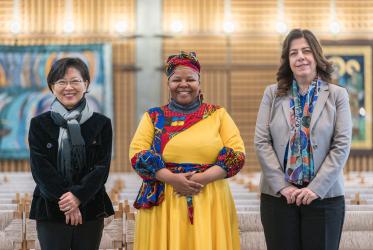The day's events began with an online gathering hosted by the YWCA of India. Speakers, including Pranita Biswasi and Dhiya Ann Mathew, highlighted the YWCA's initiatives to promote water, sanitation, and hygiene programs and encourage the adoption of Blue Community principles among its members. The discussion focused on alternatives to bottled water and the importance of community-led solutions in addressing water safety and accessibility.
Dinesh Suna, coordinator of the WCC Ecumenical Water Network, shared WCC's stance against the commodification of water, emphasising the role of governments in guaranteeing access to clean and safe water as a fundamental human right. “The WCC, having become a Blue Community in 2016, continues to advocate for public stewardship of water resources, rejecting the privatisation and sale of bottled water where tap water is safe to consume,” said Suna.
A significant highlight of another event, jointly organized by the Ecumenical Water Network-Africa, Swiss Blue Communities, and WCC was the release of the first issue of "Just Water," a newsletter by the Ecumenical Water Network-Africa. The publication features diverse activities and issues from across the African continent, sparking a lively dialogue on the challenges of ensuring safe drinking water and sustainable water practices amidst the prevalent reliance on bottled water.
The events also delved into water's symbolic and practical significance in various religious and cultural traditions, highlighting water's capacity to either provoke conflict or foster peace. Through stories like the biblical account of Isaac and Abraham's nonviolent diplomacy over water wells, the discussions illustrated the potential of water as a medium for peace and cooperation.
Reflecting on historical and contemporary water conflicts, from the disputes over the Nile River to the urgent situation in Syria, Suna highlighted the WCC’s call for a renewed focus on water diplomacy, in which WCC urges nations and communities to prioritise shared water interests, embodying the principle that water can be a powerful catalyst for peace and sustainability.
WCC also contributed to a third event on World Water Day, jointly organized by the India Peace Center and the National Council of Churches in India.
Just Water," a newsletter by the Ecumenical Water Network-Africa





